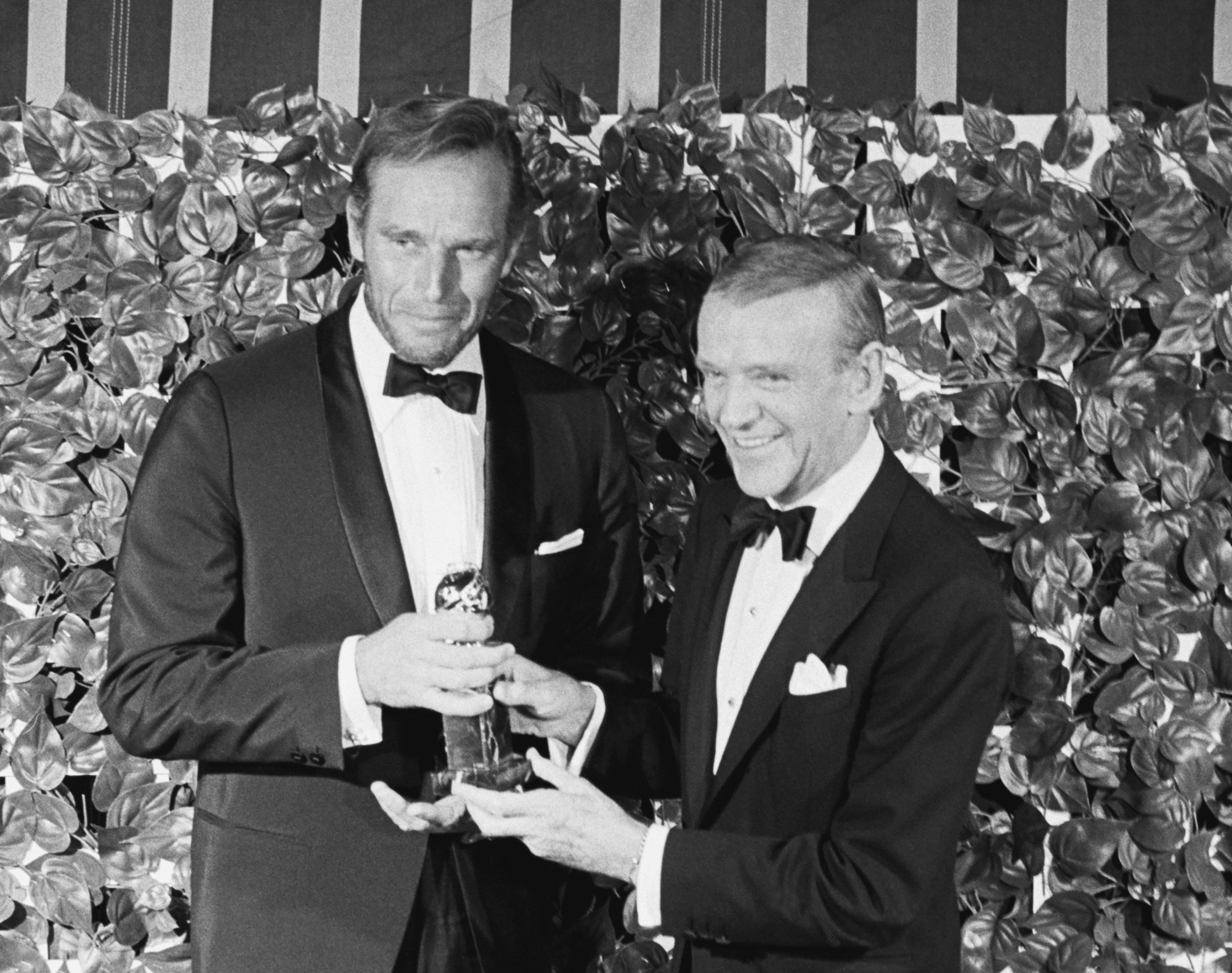
- Cecil B. DeMille
Ready for My deMille: Profiles in Excellence – Charlton Heston, 1967
Beginning in 1952 when the Cecil B. deMille Award was presented to its namesake visionary director, the Hollywood Foreign Press Association has awarded its most prestigious prize 66 times. From Walt Disney to Bette Davis, Elizabeth Taylor to Steven Spielberg and 62 others, the deMille has gone to luminaries – actors, directors, producers – who have left an indelible mark on Hollywood. Sometimes mistaken with a career achievement award, per HFPA statute, the deMille is more precisely bestowed for “outstanding contributions to the world of entertainment”. In this series, HFPA cognoscente and former president Philip Berk profiles deMille laureates through the years.To paraphrase Winston Churchill, Cecil B. deMille recipient Charlton Heston was a riddle wrapped in a mystery inside an enigma.Throughout his career he pursued different paths, achieving great success as an actor though never gaining the respect he deserved and eventually ended up ridiculed by the industry he so loved because of political beliefs and his loyalty to the National Rifle Association. Heston was essentially a self-made star. It was his appearance in a highly acclaimed student film, David Bradley’s Julius Caesar in which he played Marc Antony, which brought him to the attention of powerhouse producer Hal Wallis who signed him to a seven-year contract. At the time he was part of a stable that included Kirk Douglas, Burt Lancaster, and Lizabeth Scott.Wallis saw something in him and immediately gave him the lead in Dark City, a film noir directed by William Dieterle with Scott and Viveca Lindfors in support.He came through with a stellar performance and Cecil B. deMille was impressed enough to reward him with the lead in his all-star blockbuster The Greatest Show on Earth. When the film won the Oscar for best picture, Heston’s future was secured.This was the era of Marlon Brando and Montgomery CliftKing Vidor to co-star with Jennifer Jones in Ruby Gentry, played an Indian scout in George Marshall’s The Savage, and Andrew Jackson in The President’s Lady opposite Susan Hayward for Twentieth Century Fox. Back at Paramount, he made Pony Express, Arrowhead, The Naked Jungle, Secret of the Incas and The Far Horizons, all run of the mill studio pictures that performed well at the box office. He attempted a comedy with The Private War of Major Benson for Universal, co-starred opposite Jane Wyman in Lucy Gallant.And then once again Cecil B deMille beckoned and he was given his career-defining role as Moses in The Ten Commandments. The film, of course, was a deMille spectacle, a box office behemoth and a perennial Easter movie on television where it still earns top ratings.Now in command of his career, he chose to work with Orson Welles on Touch of Evil. It was his star power that made that film possible, and even though it was deemed a failure at the time it is now regarded as a masterpiece, some even calling it Welles’ best film. Instead of Heston walking away with deserved respect he was criticized for playing a Mexican in the film. To the rescue came William Wyler, Hollywood’s most respected film director. He gave Heston the pivotal role opposite Gregory Peck in The Big Country. The film didn’t perform as well as expected but it won a Golden Globe and an Oscar for Burl Ives. However, it was the film that would change Heston’s life. A year later he would team with Wyler as director again on his best movie, Ben Hur, which surpassed all expectations by becoming a spectacular blockbuster that won all the awards that year not just from critics but both the Golden Globe and Oscar. And Heston was finally at the top of his acting profession. His Golden Globe and Oscar as best actor guaranteed that. No longer tied to his Paramount contract he made Anthony Mann’s El Cid which fared almost as well as Ben Hur. 55 Days at Peking for director Nicholas Ray opposite Ava Gardner was also well received.Eager to work with acclaimed directors, he made Major Dundee with Sam Peckinpah, although not a great collaboration and neither was Carol Reed’s lugubrious The Agony and the Ecstasy, in which he played another titan: Michelangelo. Tom Gries’ Will Penny and Basil Dearden‘s Khartoum gave him a lifelong dream to work with Laurence Olivier but neither was well received.It was Franklin J. Schaffner’s Planet of the Apes which turned things around and gave him his most memorable role. The film, of course, spawned a franchise that defies comparison. All told there have been nine Apes films, Heston starred in one and appeared in two more.After that, his career took a back seat to his politics. Once a liberal Democrat who marched alongside Martin Luther King in Selma, he became not only a Republican but eventually a staunch right-wing backer, opposing gun control and eventually heading the NRA.There were quite a few films after that but none strong enough to revive his slumping career. He even tried television playing in The Colbys’ for two seasons. He made fun of himself in Wayne’s World 2 and spent his last years trying to further his director son’s career. Michael Moore was accused of ambushing him for his documentary Bowling for Columbine, in which he angrily walked off camera.In between, he did some theatre in Los Angeles even playing John Procter in Arthur Miller’s “The Crucible”. Retiring because of advanced Alzheimer’s disease, he received the Presidential Medal Honor from George W. Bush and died a year later at age 84. His funeral was attended only by the Hollywood Republican contingent, Rob Reiner and Oliver Stone being the two exceptions.Charlton Heston remained his own man throughout. And his legacy: three movies that everyone has seen: The Ten Commandments, Ben Hur, and Planet Of the Apes.

